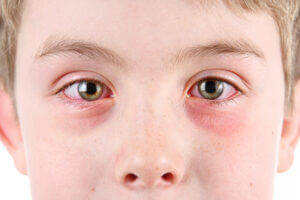 People often call conjunctivitis “pink eye” because it can cause the white of the eye to take on a pink or red color. Symptoms of pink eye can vary but typically include redness or swelling of the white of the eye. It is common in young kids. It’s usually contagious, and breakouts can sweep through preschools and playgrounds. But even teens and adults can get pinkeye. If your child will not stop rubbing their eyes and saying their eyes are itchy, you are probably dealing with conjunctivitis. When you examine their eyes, you will see that their eyes are bloodshot and inflamed. At this point, you may want to visit your pediatric doctor to find out what to do.
People often call conjunctivitis “pink eye” because it can cause the white of the eye to take on a pink or red color. Symptoms of pink eye can vary but typically include redness or swelling of the white of the eye. It is common in young kids. It’s usually contagious, and breakouts can sweep through preschools and playgrounds. But even teens and adults can get pinkeye. If your child will not stop rubbing their eyes and saying their eyes are itchy, you are probably dealing with conjunctivitis. When you examine their eyes, you will see that their eyes are bloodshot and inflamed. At this point, you may want to visit your pediatric doctor to find out what to do.
The Causes Of Pinkeye
Infectious pinkeye (the kind that can spread to others) can be caused by many of the bacteria and viruses responsible for colds and other infections — including ear infections, sinus infections, and sore throats. In some cases, pinkeye may develop as a result of allergies to ragweed, grass, and dust mites, or by being exposed to irritants or chemicals.
What Happens If A Newborn Has Pinkeye?
Newborns with symptoms of conjunctivitis (pink eye) should see a doctor right away. Neonatal conjunctivitis is a red eye in a newborn caused by infection, irritation, or a blocked tear duct. When caused by an infection, neonatal conjunctivitis can be very serious. In most cases, your newborn will be prescribed antibiotics in the form of eye drops to help clear the infection.
How Do I Know If My Child Has Pinkeye?
Besides the telltale red or pink color that gives pinkeye its name, eye discomfort is a common symptom. If your child is old enough to talk they might say that it feels like there’s sand in the eye. Often, there’s some discharge from the eye, and pain and swelling of the conjunctiva. Some kids have swollen eyelids or sensitivity to bright light. According to the Centers for Disease Control and Prevention (CDC), you should get your child medical attention if he or she is displaying some or all of these symptoms.
What Treatment Will My Child Receive For Pinkeye?
If you suspect that your child has pink eye, promptly make an appointment with his or her pediatrician.
Treatment may include:
- Allergic pinkeye: Your pediatrician may choose to treat the allergy with antihistamine medication.
- Bacterial pinkeye: Your child’s pediatrician may prescribe an antibiotic ointment or drops. Always take the full course of antibiotics prescribed by your doctor even if the symptoms go away.
- Sexually transmitted pinkeye: This is most common in newborns if the mother had a vaginal birth with an active sexually transmitted disease. This type of pinkeye would be treated with antibiotic ointment or drops.
- Viral pinkeye: Your child’s pediatrician may just want to monitor the pinkeye symptoms for a week. The doctor may advise you to apply cold compresses to your child’s eye if it becomes irritated.
How Long Does Pinkeye Last?
Contact Us (859-525-8181) if you have any questions!
—
 About Pediatrics of Florence
About Pediatrics of Florence
We believe that children are more than just “little adults.” They have unique personalities, challenges, and life circumstances and we have made every effort to make our offices and care as “kid friendly” as possible. We have an aquatic theme in the waiting rooms (separated for sick and well children) as well as themed examination rooms. All of our physicians are Board Certified Pediatricians and members of the American Academy of Pediatrics and our nurse practitioners are all licensed Pediatric Nurse Practitioners and are available to see both well and sick children.
>> Learn More About Pediatrics of Florence
